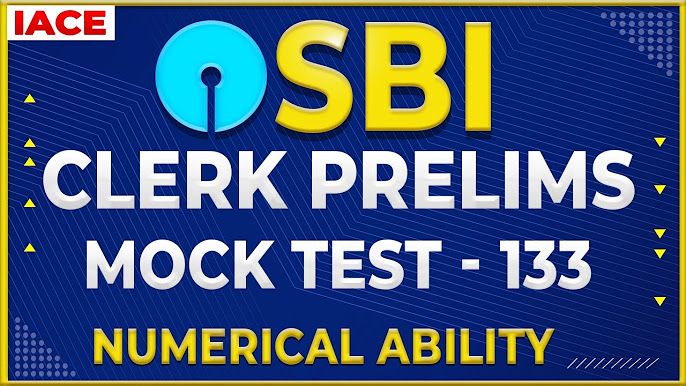Banking positions require solid mathematical foundations across all operational levels. Clerical roles involve daily numerical tasks, including transaction processing and account management. Mathematical accuracy directly impacts customer satisfaction and institutional reliability. Strong numerical skills separate successful candidates from those who struggle during examinations.
Mock assessments provide realistic evaluation environments that expose genuine mathematical capabilities. An sbi clerk mock test offers detailed insights into the numerical competency levels required for banking careers. This blog covers the specific ways mock testing evaluates mathematical abilities for aspiring bank clerks.
Arithmetic Speed Assessment Under Pressure
Basic mathematical operations form the foundation of banking calculations. Addition, subtraction, multiplication, and division must be executed quickly without a calculator. Mock tests measure computational speed while maintaining accuracy standards. Time constraints create realistic examination conditions that reveal actual solving capabilities.
Mental calculation techniques become essential during timed assessments. Quick computation methods help complete sections efficiently within allocated timeframes. Regular mock practice develops fluency in rapid calculations while building confidence for handling numerical tasks in pressure situations.
Percentage Calculation Proficiency Testing
Banking operations heavily involve percentage-based calculations for various scenarios. Interest computations, commission structures, and account balance adjustments require percentage mastery. Mock evaluations present these concepts through practical banking contexts. Candidates encounter realistic problem situations that mirror actual workplace requirements.
Complex percentage problems challenge deeper conceptual understanding beyond basic formula application. Multi-step calculations involving successive percentage changes test analytical thinking abilities. Mock testing identifies specific areas where percentage concepts need strengthening through targeted practice sessions.
Interest Rate Computation Analysis
Simple and compound interest calculations appear frequently in clerical banking examinations. These mathematical concepts directly relate to daily banking operations and customer service interactions. Mock tests evaluate understanding through diverse problem formats and application scenarios. Candidates face varying difficulty levels that build comprehensive mastery.
Advanced interest problems involve multiple variables, including rate changes and partial payment situations. Time period calculations with different compounding frequencies challenge conceptual clarity. Mock practice exposes preparation gaps while building familiarity with complex interest scenarios commonly encountered in banking environments.
Data Interpretation Skill Evaluation
Financial data appears in various formats, including charts, graphs, and tabular presentations. Mock assessments test the ability to extract relevant information quickly and accurately. Different data presentation styles require specific reading and analysis techniques. Chart interpretation involves understanding comparative values, trends, and proportional distributions effectively. The following skills receive a thorough evaluation:
- Quick data location within complex tables and graphical presentations
- Accurate number extraction from various chart formats and styles
- Rapid calculations using information derived from data sources
- Time management while handling multiple data interpretation questions
- Error-free analysis despite examination pressure and time constraints
Problem-Solving Strategy Development
Mock tests reveal individual approaches to mathematical problem-solving processes. Systematic methods produce better results compared to random solution attempts. Organised thinking patterns help maintain accuracy while building solving speed. Regular practice develops consistent approaches that work effectively under examination conditions.
Question prioritisation strategies emerge through repeated mock test attempts. Easy problems deserve immediate attention to secure quick marks. Difficult calculations can be attempted after completing straightforward questions. Strategic time allocation prevents losing marks on simple problems due to excessive focus on challenging ones.
Speed-Accuracy Balance Achievement
Successful numerical performance requires balancing calculation speed with answer precision. Mock evaluations help candidates find optimal solving rhythms that maintain both elements effectively. Rushing creates careless errors while excessive caution wastes valuable examination time. Regular practice builds natural pacing that suits individual capabilities.
Different mathematical topics require varying time investments based on complexity levels. Simple arithmetic operations take minimal time while complex word problems demand careful analysis. Mock testing helps develop realistic time budgets for different question categories during actual examination attempts.
Error Pattern Identification Methods
Mock test results reveal consistent mistake patterns across different mathematical concepts. Systematic error analysis helps identify whether problems stem from conceptual confusion or computational carelessness. Understanding error types enables targeted improvement efforts rather than generic study approaches.
Calculation mistakes often occur due to rushing or nervousness during examinations. Conceptual errors indicate fundamental understanding gaps that require additional study focus. Mock practice builds awareness of personal error tendencies while developing strategies for mistake prevention during actual testing situations.
Systematic engagement with an sbi clerk mock test develops reliable numerical skills, identifies improvement areas, and creates familiarity with banking-specific mathematical scenarios. Mock evaluations serve as powerful diagnostic tools for assessing numerical abilities essential for banking careers. These structured assessments provide detailed feedback about mathematical competencies while building examination confidence through regular practice.

